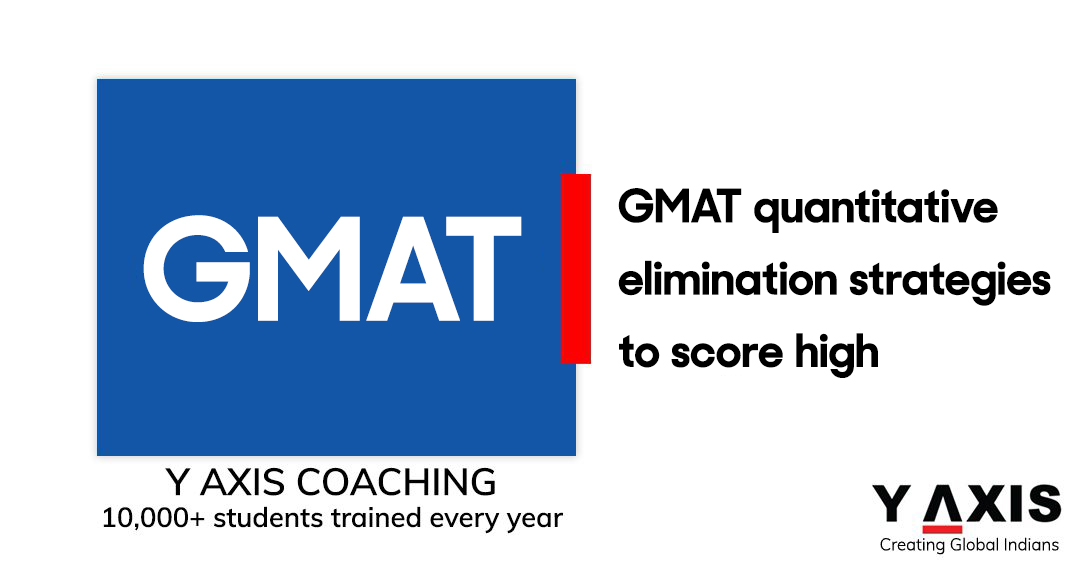Posted on October 13 2023
GMAT quantitative elimination strategies to score high
By , Editor
Updated October 31 2023
Why score high on GMAT?
- Accepted by top B-schools globally
- Increases scholarship opportunities
- Improves career prospects
- Helps you migrate abroad
- Assesses reasoning skills and critical thinking abilities
GMAT quantitative elimination strategies to score high
Most applicants take the Graduate Management Admission Test (GMAT) to gain admission into an MBA or any other graduate management program.
Here, too, colleges and universities take into consideration applicants who score high in the GMAT quantitative section.
But, future test takers of the GMAT should realize that its quantitative section needs skills that are different from the quantitative skills that they have been taught in high school and colleges. It is more of a reasoning assessment than a mathematics test.
Intro to the quantitative section
Two types of questions are asked in the section on quantitative reasoning. One is problem-solving, and the other is data sufficiency. To answer questions of both types, candidates need to have arithmetic knowledge, common concepts of geometry, and basic algebra. The toughest aspect of these questions lies in logical and analytical skills more than in fundamental mathematics skills.
Test-takers cannot make use of a calculator while answering the questions in the quantitative section.
In problem-solving, the candidates’ ability to use reasoning logically and analytically to solve quantitative problems is assessed through multiple-choice questions.
In data sufficiency, the ability of the test takers to evaluate a quantitative problem is assessed. They should identify which data is relevant and decide at what point there is sufficient data to crack a problem.
Here, a question with a problem will be given that will consist of two statements. The candidates should use data given in the statements, in addition to their mathematics knowledge and general awareness, to you decide whether they have adequate data to answer the question posed.
Why are GMAT quant questions difficult?
Unlike in tests of high schools and colleges where complications in the mathematical concepts are tested, the GMAT quant is tough to solve because you need to identify the type of thinking required.
Similarly, a basic mathematics test assesses whether candidates have grasped the concepts. On the other hand, in the GMAT quant section, it is expected that you know particular concepts, and you are posed reasoning questions to examine how quickly you can apply those concepts to arrive at an answer. Your knowledge, therefore, of replying to GMAT quant questions must be strong enough so that you can answer each question proficiently and, on average, within two minutes.
You need to be good at approximation, which will help you solve problems quickly. If you provide an answer closest to the right answer, it will help you. You need to develop other such skills as plugging in and backsolving to answer questions rapidly and successfully.
Grasp the basics
To score high on the GMAT exam, the process of taking an educated guess or elimination process will not help you. You must be able to figure out the differences in probability between events that are dependent and independent.
Don’t look for complicated answers
Certain students look to give complex answers to the GMAT quant questions. It does not work because most quant questions in GMAT have solutions that are close-ended. When designing GMAT quant questions, examiners introduce one or two key elements that test takers should identify to answer the questions correctly. When students look at the key components of a question, it becomes simpler to answer within a minute.
Make efforts to get rid of weaknesses
Most often, students avoid GMAT quant question types that are specifically tough for them. But these difficult types of questions are the ones they can significantly improve on.
A lot can be achieved by them if they can put effort into the areas they are weak in. They can increase their scores further in the quant section by taking these necessary steps.
Schedule timing
Schedule the time to answer questions when you take the practice tests for the GMAT quant section so that it will help you on the test day.
If you want to take the GMAT test, get in touch with Y-Axis, a premier overseas immigration consultancy, to get proper coaching and guidance.
HOW CAN Y-AXIS ASSIST YOU TO STUDY ABROAD?
Y-Axis is the right mentor to advise you on Study in Australia. It helps you with
- Choose the best path for you with the help ofY-Path.
- Coaching services, assists you ace your IELTS test results with our live classes. This helps you to score well on the exams required to study in Australia. Y-Axis is the only overseas consultancy which provides world-class coaching services.
- Get counseling and advice from proven expertise to advise you in all the steps.
- Course Recommendation, get an unbiased advice with Y-Path that puts you on the right path to success.
- Guides and assists you in writing commendable SOPsand Resume
Tags:
Approaches to be successful in GMAT quant section
Strategies to adopt to get a high score in GMAT quant section
Strategies to score high in GMAT quant section
Share
Options for you by Y-Axis
Get it on your mobile
Get News alerts
Contact Y-Axis

